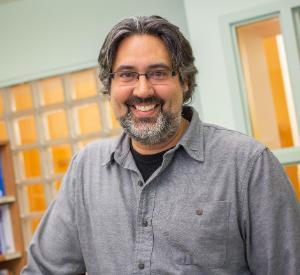
Although social isolation has been a hot topic since the COVID-19 pandemic began, it’s an issue far too many seniors have been facing long before there was talk of quarantines and lock downs.
And that’s something Dr. Albert Banerjee hopes to remedy.
Banerjee is the NBHRF Research Chair in Community Health and Aging at St. Thomas University, and his latest research project will study the experience of social isolation among older adults.
“Social isolation among older persons is being increasingly recognized as a concern,” Dr. Banerjee explained. “Social isolation affects over 30 per cent of older Canadians and is associated with a range of negative health outcomes. Although I initially began planning this research before COVID-19, as you can imagine, the topic of social isolation is even more relevant now.”
The project came out of a collaboration with Fredericton’s Age-Friendly Committee and Meals on Wheels. Its goal is to contribute to the development of community-based strategies to address social isolation in Fredericton, NB. The research is funded by Mitacs, a national research organization that operates research and training programs in fields related to industrial and social innovation.
Banerjee hopes to understand the experience of socially isolated older adults and be able to identify promising interventions.
“Social isolation is not always experienced negatively. Solitude especially if it is temporary or chosen can be meaningful for some people. But that’s often not the case. Illness, disabilities, families and friends leaving the city, and even bad weather can make it difficult for older adults to connect. Cut backs to care and community services can also increase isolation and contribute to feelings loneliness.”
He and his research assistant, Lyne Ouellet, a master’s student at the University of New Brunswick, will review existing research on interventions for social isolation, do an environmental scan of active interventions within the city and abroad, as well as interview older adults. These older adults will be identified through a partnership with Meals on Wheels, an organization that serves more than 350 clients in the Fredericton area, many of whom are socially isolated.
“Obviously we have all become more aware of how social isolation can impact people, given the changes in our society in the last few months; however, social isolation among the elderly has been identified as an issue for older adults for quite some time now,” Ouellet said.
“Several years ago, the US Surgeon General had even gone as far as calling it a global epidemic among the world’s elderly population. Given how big an issue it was prior to this makes it all the more necessary to address it now. Many older adults who might have been socially active prior may now have withdrawn as a means of avoiding this illness, resulting in more older adults at risk of the negative effects of social isolation.”
Social isolation has been linked with an increased risk of dementia, cardiovascular disease, hospitalizations, needing placement in a nursing home and even an increased risk of death.
“Indeed, they have found the risk of death due to social isolation is equivalent to smoking 15 cigarettes a day or as having an alcohol disorder and has surpassed the risks associated with obesity,” Ouellet added. “On the other hand, those who have better social relationships in older age have a 50 per cent increased likelihood of survival, are more likely to follow medical advice, and have less hospitalization time.”
Banerjee and Ouellet say it’s improbable to identify one perfect intervention that would fix social isolation, but they are hopeful their research will help fill the gaps.
“What has been shown to be most effective is when research is combined with participation from the community as well as from those who will use the services,” Ouellet said.
“This project has been organized to meet that goal. There will be a review of what interventions have been shown to work in certain situations and there is collaboration with community partners. The experiences of those who would most benefit from these interventions will be gathered. All of this will then be used to further identify gaps and benefits that exist in Fredericton in order to make sure those who need help the most will receive the proper interventions. In doing so, the community will assist in the health and wellbeing of all its members.”
-(2).jpg)
/filters:format(webp)/prod01/stuca/media/stu/site-assets/images/features/registration-news-box.png)
/filters:format(webp)/prod01/stuca/media/stu/site-assets/images/features/Sandra-Irving-Web-News-Box.jpg)
/filters:format(webp)/prod01/stuca/media/stu/site-assets/images/Intersession-and-Summer-Session_NewsItem.jpg)